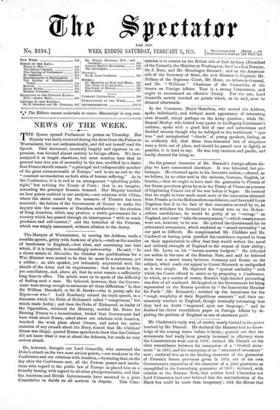On the g eneral character of Mr. Disraeli's forei g n-affairs dis- play
we have commented elsewhere. It was laboured, but pic- turesque. He returned again to his favourite notion,—shared, as we believe, by no other soul in the universe, German, English, or Semitic,—that we ought to have used the guarantee to Prussia of her Saxon provinces given by us in the Treaty of Vienna as a means of frightening France out of the war before it began. He insisted that we ought to have made much more of the concession obtained from Prussia as to the Hohenzollern candidature, and have told Louis Napoleon that if in the face of that concession secured by us, he did not withdraw his demand for a formal veto on the Hohen- zollern candidature, he would be guilty of an " outrage " on. England, and must " take the consequences,"—which consequences. were not, however, to be war. He quizzed the Government for its attenuated armaments, which rendered an " armed neutrality" on our part so difficult. He complimented Mr. Childers and Mr. Cardwell on having quite justified the confidence reposed in them on their appointment to office that they would reduce the naval and military strength of England to the utmost of their ability ; and Mr. Lowe on his " harum-scarnm budgets." He ridiculed our action in the case of the Russian Note, and said he believed there was a secret treaty between Germany and Russia on the subject, which made our appeal to Count Bismarck as undignified as it was simple. He depicted the " cynical cordiality " with which the Count offered to assist us by proposing a Conference, in which, as a matter of course, Russia's high-handed proceeding was first of all condoned. He laughed at the Government for being represented on the Roman question by " the honourable Member for Perth " (Mr. Kinnaird) ; touched up the Americans for the " rough simplicity of their Republican manners " and their un- mannerly conduct to England, though ironically intimating that they had no doubt " improved upon our language ; " and he finished his clever roundabout paper on Foreign Affairs by de- picting the position of England as one of enormous peril.






























